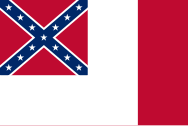
Back Democràcia Herrenvolk Catalan Herrenvolk-Demokratie German Democracia Herrenvolk Spanish Démocratie Herrenvolk French Herrenvolk-democratie Dutch Democracia Herrenvolk Portuguese Herrenvolk democracy SIMPLE Herrenvolk-demokrati Swedish Herrenvolk demokrasisi Turkish
Confederate States of America
Apartheid South Africa
Republic of Rhodesia
The Confederate States of America (flag, top; 1861–1865), Apartheid South Africa (flag, middle; 1948–1994), and Rhodesia (flag, bottom; 1965–1979) are considered archetypical examples of Herrenvolk democracy. Elections were/are generally free, but voting suffrage was restricted based on race, with governance that reflected the interests of the politically dominant racial group.
Herrenvolk democracy is a form of government with elections in which only a specific ethnic group has voting rights and the right to run for office, while other groups are disenfranchised.[1] Herrenvolk democracy is a subtype of ethnocracy, which refers to any form of government where one ethnic group dominates the state, with or without elections. The German term Herrenvolk, meaning "master race", was used in 19th century discourse that justified colonialism with the supposed racial superiority of Europeans.[2]
- ^ Vickery, Kenneth P. (June 1974). "'Herrenvolk' Democracy and Egalitarianism in South Africa and the U.S. South". Comparative Studies in Society and History. 16 (13): 309–328. doi:10.1017/s0010417500012469. JSTOR 17826.
- ^ Gründer, Horst (1999). "Ideologie und Praxis des deutschen Kolonialismus" [Ideology and practice of German colonialism]. In Beck, Thomas (ed.). Überseegeschichte [Overseas history]. Stuttgart: F. Steiner. pp. 254 et seq. ISBN 9783515074902.
© MMXXIII Rich X Search. We shall prevail. All rights reserved. Rich X Search


